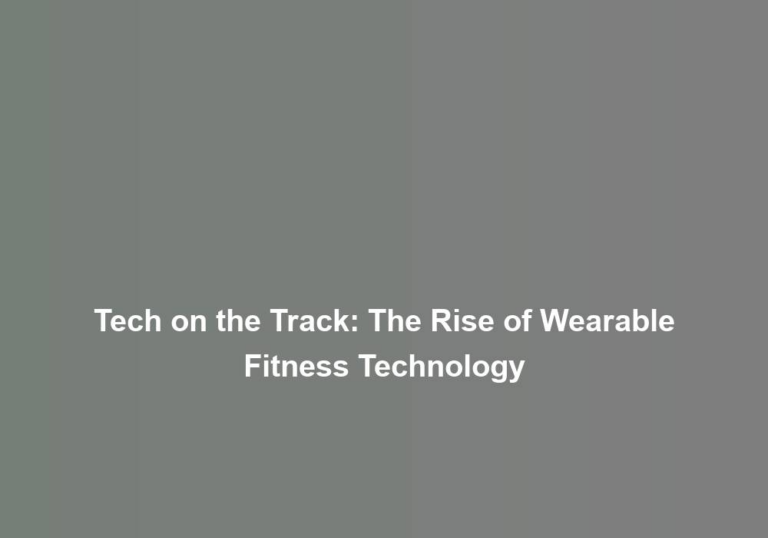Track, Train, Transform: The Impact of Fitness Trackers
You probably think youG??ve heard it all when it comes to fitness trackers, but the impact they can have on your overall health and wellness might surprise you. From revolutionizing the way you train to transforming your daily habits, the influence of fitness trackers goes beyond just counting steps. But how exactly do these simple devices manage to make such a significant impact? ThereG??s more to it than meets the eye, and youG??re about to uncover the insightful details that could change the way you approach your fitness journey.
The Evolution of Fitness Tracking
The evolution of fitness tracking has revolutionized the way individuals monitor their physical activity and health, providing a deeper understanding of their daily exercise and wellness routines. Early adopters of fitness trackers were drawn to the novelty of being able to quantify their daily movements and exercise. Technological advancements in sensors, data analytics, and connectivity have propelled these devices from simple step counters to comprehensive health and fitness tools.
Early adopters were intrigued by the potential of these devices to track not only their steps but also their heart rate, sleep patterns, and calorie expenditure. As technological advancements progressed, fitness trackers became capable of providing more accurate and comprehensive data, enabling users to make more informed decisions about their health and fitness. These advancements also allowed for greater integration with smartphones and other devices, creating a seamless experience for users to access and interpret their health data.
The evolution of fitness tracking has led to a sense of belonging among users who are part of a community focused on health and wellness. The ability to track and share fitness achievements through social platforms has fostered a sense of camaraderie and motivation. As more individuals embraced fitness tracking, the technology continued to evolve, offering features such as GPS tracking, personalized workout recommendations, and real-time coaching.
Understanding Fitness Metrics
Understanding fitness metrics requires a comprehensive grasp of the data derived from your fitness tracker, allowing you to interpret and leverage the information effectively for your health and wellness goals. When delving into the world of fitness metrics, itG??s essential to understand the significance of the data provided by your fitness tracker. HereG??s how you can make the most of this information:
-
Track Your Fitness Progress:
-
Utilize the data from your fitness tracker to monitor your progress over time. This can include tracking your steps, heart rate, sleep patterns, and calorie expenditure. By analyzing this data, you can gain valuable insights into your overall fitness journey and make informed decisions about your health.
-
Setting SMART Goals:
-
Leverage fitness metrics to set Specific, Measurable, Achievable, Relevant, and Time-bound (SMART) goals. For instance, aim to increase your step count by a certain percentage each week or reduce your resting heart rate over a specific period. By setting precise goals based on your fitness metrics, you can stay motivated and focused on your health objectives.
Understanding fitness metrics is pivotal for maximizing the benefits of your fitness tracker. By leveraging the data to track your fitness progress and set SMART goals, you can harness the power of technology to optimize your health and wellness journey.
Incorporating Data Into Workouts
You can now leverage the data collected from your fitness tracker to optimize your workout plans and gain personalized insights into your fitness journey. By incorporating this data into your workouts, you can make informed decisions about your exercise routines, track progress, and set realistic goals based on your personal metrics. The integration of fitness data empowers you to tailor your workouts to your individual needs and maximize the effectiveness of your fitness regimen.
Data-Driven Workout Plans
Incorporating data into your workouts allows for a personalized and optimized fitness regimen tailored to your specific needs and goals. With customized recommendations and performance analysis, data-driven workout plans provide a targeted approach to improving your fitness level. By analyzing your workout data, such as heart rate, steps taken, and calories burned, fitness trackers can offer personalized recommendations for exercise intensity, duration, and frequency. This data-driven approach ensures that your workouts are aligned with your fitness goals, whether itG??s weight loss, endurance improvement, or muscle gain. Additionally, performance analysis allows you to track your progress over time, enabling you to make informed decisions about adjusting your workout routine for continuous improvement. Embracing data-driven workout plans empowers you to achieve better results and maximize your fitness journey.
Personalized Fitness Insights
By analyzing your fitness data, fitness trackers provide personalized insights that optimize your workout regimen to align with your specific fitness goals and needs. These insights are invaluable for enhancing fitness motivation and exercise adherence. By tracking your heart rate, sleep patterns, and activity levels, fitness trackers offer tailored recommendations to keep you engaged and committed to your fitness journey. With personalized data-driven insights, you can discover patterns in your workouts, identify areas for improvement, and set achievable targets. Whether itG??s adjusting your intensity levels, diversifying your workout routines, or setting realistic goals, these insights empower you to make informed decisions that drive progress. By incorporating your personalized fitness insights into your workouts, youG??ll experience a heightened sense of belonging to a community that values your individual fitness aspirations.
Behavioral Changes and Accountability
The use of fitness trackers has been shown to drive meaningful behavioral changes and foster greater personal accountability for physical activity levels. Behavioral motivation is a critical aspect of fitness tracking, as it provides you with tangible data that can lead to increased self-discipline and accountability. HereG??s a closer look at the impact of fitness trackers on behavioral changes and accountability:
-
Data-Driven Motivation
-
Fitness trackers provide real-time data on your activity levels, allowing you to set specific goals and track your progress. This data-driven approach can serve as a powerful motivator, encouraging you to be more accountable for your daily physical activity.
-
Social Accountability
-
Many fitness trackers offer social features that allow you to connect with friends, family, or online communities. By sharing your progress and engaging in friendly competitions, you can enhance your sense of accountability and motivation to stay active.
Fitness trackers not only serve as a source of behavioral motivation but also promote self-discipline and accountability by empowering you with the information needed to make informed decisions about your physical activity. The ability to track your progress, set achievable goals, and engage in social support networks can significantly impact your commitment to leading a more active lifestyle. As a result, fitness trackers play a pivotal role in fostering behavioral changes and promoting personal accountability for physical activity levels.
Tracking Sleep and Recovery
Now letG??s talk about how fitness trackers can help you monitor your sleep quality and analyze your recovery time. With advanced sensors and algorithms, these devices can provide valuable insights into your sleep patterns, including duration, efficiency, and disturbances. Understanding your sleep and recovery patterns can help you make informed decisions about your daily routine and overall health, ultimately leading to better performance and well-being.
Sleep Quality Tracking
Improving your sleep quality and monitoring your recovery is an essential aspect of fitness tracking, providing valuable insights into your overall well-being and performance. Using fitness trackers to monitor sleep patterns allows you to gain a deeper understanding of your sleep quality, helping you make adjustments to improve your overall health. By tracking your sleep patterns, you can identify trends and make informed decisions to optimize your sleep and recovery. Fitness trackers also provide tools for stress management, allowing you to monitor your stress levels and understand how they may be impacting your sleep quality. By leveraging these insights, you can develop strategies to improve your sleep, manage stress, and ultimately enhance your overall well-being. This holistic approach to tracking sleep and recovery empowers you to take control of your health and fitness journey.
- Understand sleep patterns
- Gain insights into sleep quality
- Make informed adjustments
Recovery Time Analysis
Monitoring your recovery time is an integral part of fitness tracking, allowing you to gain a deeper understanding of your bodyG??s needs and optimize your overall well-being and performance. By tracking your sleep patterns and recovery time, you can effectively manage your training load, prevent injuries, and enhance your performance. Understanding the time needed for recovery optimization is crucial for injury prevention and training efficiency. Below is an example of how recovery time can be tracked:
| Sleep Duration (Hours) | Resting Heart Rate (bpm) |
|---|---|
| 7 | 60 |
| 8 | 58 |
| 6.5 | 62 |
| 7.5 | 59 |
Analyzing this data can provide insights into your bodyG??s recovery patterns, allowing you to make informed decisions to optimize your training and overall well-being.
The Future of Fitness Tracking
The future of fitness tracking holds the promise of enhanced user experience through advanced sensors and personalized data analysis. As technology continues to evolve, the fitness tracking industry is poised for exciting innovations that will revolutionize the way we monitor and improve our health and wellness. HereG??s what you can expect from the future of fitness tracking:
- Future Innovations
- Biometric Monitoring: Imagine fitness trackers that can analyze blood glucose levels, hydration status, and even stress hormones, providing a comprehensive view of your health beyond just steps taken and calories burned.
- AI Integration: Future fitness trackers may incorporate artificial intelligence to provide real-time feedback and personalized recommendations, taking into account individual preferences and goals.
These future innovations are incredibly promising, but they also raise ethical implications that must be carefully considered. As fitness trackers become more advanced and integrated into our daily lives, questions about data privacy, consent, and potential discrimination based on health data may arise. ItG??s essential for companies and regulators to address these ethical concerns to ensure that the benefits of fitness tracking technology can be enjoyed by everyone without compromising individual rights and autonomy.
The future of fitness tracking is an exciting frontier, offering the potential for unparalleled personalization and insights into our health. As these innovations unfold, itG??s important to stay informed and engaged in the ongoing conversation about the ethical implications of these advancements.
Conclusion
YouG??ve tracked, trained, and transformed your fitness journey with the precision of a digital conductor. As you navigate the data-driven landscape of fitness tracking, youG??ve harnessed the power of technology to optimize your workouts, monitor your progress, and hold yourself accountable. With sleep tracking and recovery metrics on the horizon, the future of fitness tracking promises to revolutionize the way you approach your health and wellness. Stay plugged in, stay informed, and continue to elevate your fitness game.







